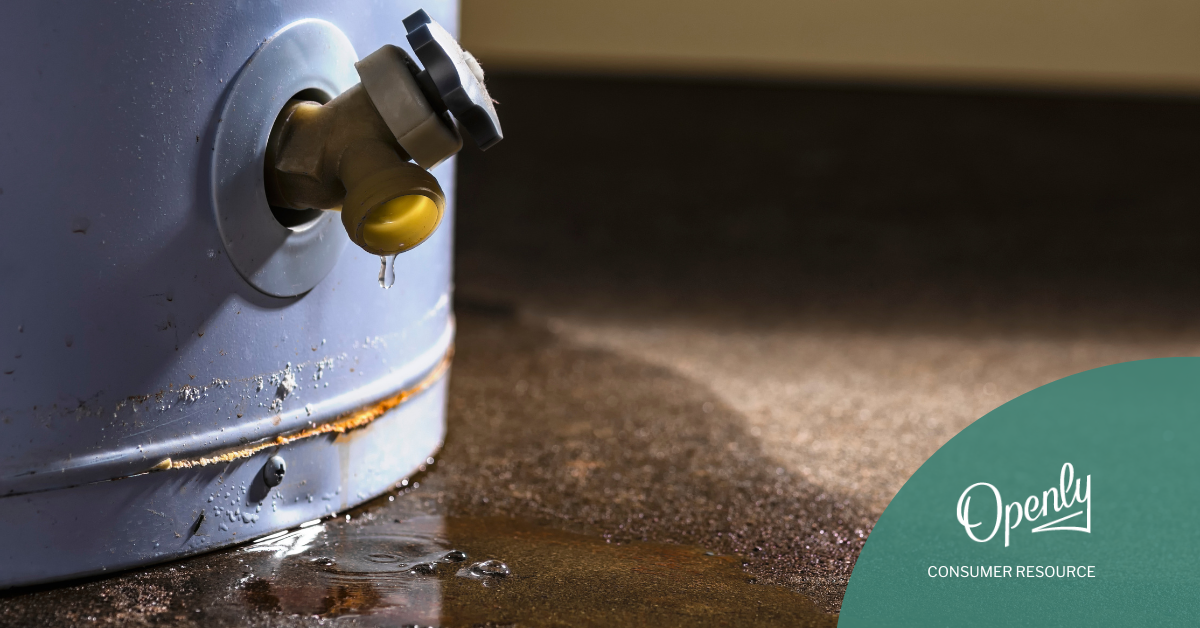Ever imagine stepping into a cold shower on a brisk morning? Yikes! It's a jolt that can ruin the start of anyone's day. We often take it for granted, but the humble water heater plays a vital role in our daily comfort, providing warmth for everything from soothing showers and clean dishes to efficient laundry cycles.
However, like any hardworking appliance, water heaters age and can develop problems. Recognizing the signs and understanding basic maintenance can save you from unexpected cold surprises and costly repairs. Keep reading to learn more about home insurance coverage for water heaters, and when you may find yourself in need of an upgrade.
At a glance:
- Home insurance generally covers sudden and accidental water heater damage, like a burst pipe causing a flood.
- Normal wear and tear, lack of maintenance, and manufacturer defects are common exclusions in home insurance policies regarding water heaters.
- Paying attention to signs like lukewarm water, unusual noises, and leaks can help homeowners detect water heater issues early—and avoid significant problems.
Does home insurance cover water heaters?
Generally, your policy offers water damage coverage, or protection against sudden and accidental damage to your water heater. Think of events like a pipe unexpectedly bursting and causing water damage. In scenarios such as these, your home insurance would likely help cover the costs associated with the damage.
What is excluded by home insurance?
When it comes to water heater damage, here are the common exclusions you should be aware of:
- Normal wear and tear—If your water heater fails or leaks due to its age and the gradual deterioration of its components, this is typically not covered. Insurance providers expect homeowners to maintain their appliances and understand that they have a limited lifespan.
- Lack of maintenance—If damage occurs because you haven't properly maintained your water heater, such as failing to flush sediment, ignoring small leaks, or not replacing the anode rod (in applicable models), your claim may be denied. Insurance companies consider proper maintenance the homeowner's responsibility.
- Manufacturer defects—If the water heater malfunctioned or leaked due to a flaw in its manufacturing, this is usually the responsibility of the manufacturer and would be addressed under the appliance's warranty, not your homeowner's insurance.
- Improper installation—If the water heater was installed incorrectly and this faulty installation leads to damage, your homeowner's insurance may not cover it. The installer's workmanship warranty should ideally cover such issues.
- Pre-existing conditions—If your water heater had a known issue (like a slow leak) that you didn't address, and this eventually led to more significant damage, the insurance company might argue that the damage wasn't sudden or accidental and deny the claim.
- Water backup from sewers or drains—Damage caused by water backing up into your home from sewers or drains is usually excluded unless you have purchased a specific additional coverage or endorsement for sewer backup. However, it's important to understand your specific policy, as different insurance providers have different inclusions and exclusions.
- Flood damage—Damage caused by natural flooding (external sources of water) is rarely covered by standard homeowner's insurance policies. You would need a separate flood insurance policy for this.
- Intentional acts—If you intentionally damage your water heater, your insurance will not cover the damage.
Addressing minor problems early on and keeping your water heater in good working order, can help not only extend the lifespan of your water heater, but also potentially avoid costly repairs and the headache of dealing with water damage claims that might not be covered. Taking proactive steps is the best way to safeguard your home and your wallet.
It's always important to review your specific homeowner's insurance policy to understand the exact coverages and exclusions that apply to your situation. Consulting with your insurance agent can also provide clarity on your policy's details.
Types of water heaters
When it comes to water heaters, there are two main contenders: storage tank or tankless, each with its own set of pros and cons:
Storage tank water heaters
These are the traditional workhorses found in most homes. They heat and store a certain capacity of water, ready for use.
Available in various sizes to meet different household demands. An appropriately sized tank can reduce the risk of running out of hot water, which can sometimes lead to occupants taking longer showers and potentially increasing water usage.
Both gas and electric models exist, with varying efficiency. Less efficient models can contribute to higher utility bills. Over time, these tanks are susceptible to internal corrosion and sediment buildup, which can lead to leaks and potential water damage claims. Regular maintenance is key to preventing these issues.
Tankless water heaters
These modern units heat water on demand as it flows through the unit, providing hot water on demand and offering a near-continuous supply.
While offering endless hot water and saving space, their higher upfront cost and potential strain on older plumbing or electrical systems should be considered. Improper installation or insufficient capacity for a large household could lead to operational issues and potentially unexpected strain on your home's infrastructure.
Experience Peace of Mind with Openly
You deserve home insurance coverage that's straightforward and exceptional. Openly delivers the protection and confidence you need—so you can worry less and live more.
Signs your water heater may be failing
Catching water heater problems early can save you from significant headaches and expenses. Your unit often provides clues that something isn't right long before a complete breakdown. A malfunctioning water heater can lead to significant water damage, which is often a source of homeowner's insurance claims. Pay attention to these common indicators—they're your water heater's way of asking for help:
- Lukewarm showers—This is a telltale sign that your water heater isn't heating efficiently.
- Unusual noises—Rumbling, popping, or hissing sounds could indicate sediment buildup or heating element issues.
- Leaks—Any visible water pooling around the base of the unit is a serious concern and needs immediate attention.
- Rusty water—Discolored hot water often points to corrosion inside the tank.
Simple maintenance tips
Extending the lifespan of your water heater and ensuring efficient operation doesn't require a plumbing degree. Here are some simple steps you can take:
- Regular flushing—Sediment buildup is a common culprit behind reduced efficiency and premature failure. Flushing your tank every 6-12 months helps remove this buildup.
- Checking the pressure relief valve—This safety valve prevents excessive pressure. Test it annually by briefly lifting the lever and ensuring water flows out and then stops.
- Consider anode rod replacement—For storage tank water heaters, the anode rod sacrifices itself to protect the tank from corrosion. Depending on water quality, it may need replacement every few years.
- Professional inspections—Schedule annual or bi-annual inspections by a licensed plumber, especially for older units, to catch potential issues early.
Keeping your home comfortably warm
Your water heater is an important component in the comfort and functionality of your home. Understanding the different types, recognizing the signs of trouble, and implementing basic maintenance can help you ensure a steady supply of hot water for years to come.
Don't wait for a cold shower to remind you of your water heater's importance! Schedule regular professional inspections and carefully consider your household's hot water needs when choosing between a tank or tankless system.
For specific recommendations tailored to your home, always consult a licensed plumber. And remember, while home insurance offers a safety net for unforeseen events, proactive maintenance is your best defense against unexpected hot water headaches.
Frequently Asked Questions
How long does a typical water heater last?
Conventional tank water heaters typically last 8-12 years, while tankless models can last 15-20 years or longer with proper maintenance.
How often should I flush my water heater?
It's generally recommended to flush your water heater every 6-12 months to remove sediment buildup.
Why is my hot water discolored?
Rusty or discolored hot water often indicates corrosion inside the storage tank. It's best to have it inspected by a plumber.
Is a tankless water heater always more energy-efficient?
Tankless water heaters eliminate standby heat loss, making them potentially more energy-efficient, especially for households with variable hot water usage. However, the overall savings depend on your specific usage patterns.
When should I replace my water heater?
If your water heater is nearing the end of its expected lifespan, experiencing frequent issues, or showing signs of significant corrosion, it's likely time for a replacement.
We provide this information to help you understand insurance. Any coverage is subject to the terms of your policy. Please refer to your policy and declarations page for complete terms, conditions, exclusions and coverage details. Openly may provide links that lead to an external website that may promote goods and services that Openly does not endorse. We are not responsible for the content, claims, or representations made on the linked website. Please review their terms and policies before engaging with any offerings.




.png?width=334&height=200&name=burst%20pipes%20(1).png)